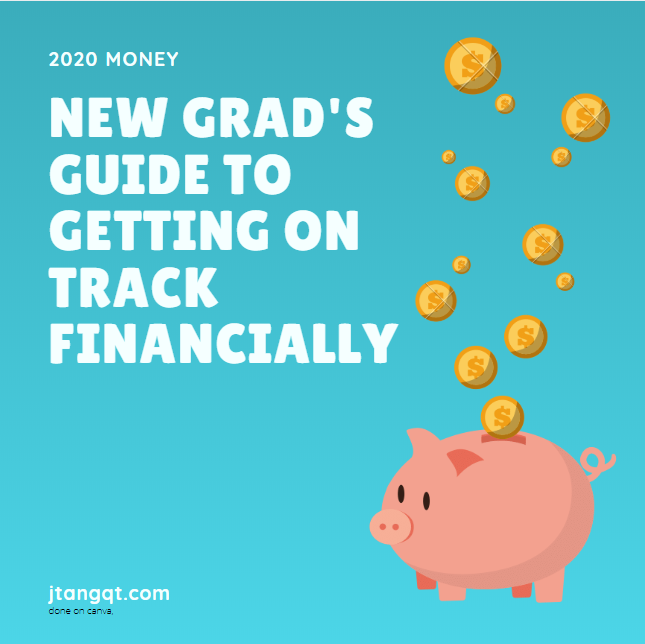New Grads Guide to Getting on Track Financially
As you all may know, I’m a freshly graduated young hooman. I just started my first job and I put together some things I wish someone had just told me instead of having to research. I’m going to break them down into broader categories.
They will generally be in order of priority. Think of phase 1 as the first pass through where you allocate for those things first before you go through them again in phase 2.
I will update this post with links to new information as I expand on each.
Taxes -
No matter how much you make, there will always be tax: property tax, sales tax, income tax, etc. I will speak solely on income tax. The government calculates your tax through how much taxable income you make. Taxable income is exactly what it sounds like, all of the income used to calculate the amount of taxes you owe. Before you get too excited and say you only want the government to tax 5% of the income you make. At the basis, all of your income is taxable; however, there are a few accounts that are tax advantaged. I will speak a lot about this.
A tax advantaged account is an account that decreases your taxable income, let’s walk through a concrete example. So say my income is $35,000 and I put $6000 in a tax advantaged account, that means I only have to pay taxes on $29,000 of it; this works out to be around $1419 in tax savings right now.*
* - in the state of California, assuming post-tax account
Health Insurance -
It is very important to figure out what type of health insurance your company offers, if you have the opportunity for Health Savings Account (HSA) and Flexible Savings Account (FSA), take them. These are important because they are tax advantaged accounts specifically meant to be used for health reasons.
I put this right after taxes since it’s the most valuable and underrated type of tax advantaged account. Whereas most tax advantaged accounts require you to pay taxes at least once, saving and using a HSA/FSA doesn’t require any taxes. I also think that health is the most important thing, although you may feel young and invincible, you always want to have some protection in case something bad does happen.
What to do :
Phase 1: If you have HSA and/or FSA, maximize those accounts first. If you can only choose one, take the HSA.
Phase 2: Maintain your monthly allocation for your HSA/FSA
Retirement -
Retirement… it’s 40 some years away for me and yet I’m saving for it??? Does this make sense?? Yes. It might not make any sense because you feel like you’re not even earning enough to support yourself. I know, it freaking sucks to feel that way. But compounding interest can make a huge difference! Say you invest $5 every month for 20 years, you’ll earn more than if you invested $10 every month for the last 10 years of those 20 years. I’ve attached a compound interest calculator here for you to experiment with.
In normal brokerage accounts, you get taxed on whatever money you earn. So when you put your after tax money in, the money you earn using that after tax money also gets taxed. Now, here’s where our tax advantaged retirement accounts come in.
What to do:
Phase 1: Generally, as a new grad is that you’ll want to max out your Roth IRA* and maximize the matching you get on 401K from your company / employer (if they offer that)
Phase 2: You can decide if you want to to increase your contribution to your 401k up until its limit.
* I included my favorite brokerage firms on my about page
Emergency Savings -
I put this before student loans for a very specific reason. I think it is important to prioritize a small amount of emergency savings even if you want to pour the rest of your money into student loans. This is just as the name of the savings says: it’s for an emergency. You never know when that may happen, like going to the doctor’s. This way, not all of your money is tied to paying off your student loans and you won’t rack up credit card debt in case something big in your life happens.
What to do :
Phase 1: Build up a small emergency savings fund of $1000 in a high yield savings account.*
Phase 2: Slowly increase your emergency savings to account for 3 - 6 months of living expenses (rent, groceries, etc.).
* There are some really great high yield savings accounts online like Betterment and Wealthfront, I’ve included links to them on my about page.
Student Loans -
Figure out how much you need to be paying to pay back your student loans. Look at them carefully. It’s important to note that sometimes paying off the minimum amount may not be right. If your minimum amount is less than your interest, then you’ll essentially never pay off your loans. I put this here because student loan interest rates are lower than other forms of loans.
What to do:
Phase 1: Figure out how much you need to pay every month to pay it off
Phase 2: Look into avalanche / snowball method to pay off your debt; however, in the second pass through, I would prioritize this before emergency savings.
Budgeting -
Budgeting!! It is important to know exactly how much money is coming and how much you need to pay per month. Knowing these things first, you can create a budget that works for you. The first few months may be more about gathering information on how you actually spend money, but after a while you can predict your triggers/guilty pleasures and either factor them into your budget or really decide that you don’t want it in your life.
I put this here because allocating at least the minimum for loans, health, 401k/IRA, & emergency funds comes first. However, I think budgeting is super important, so think about your living expenses: how much can you afford on rent/what is your rent, how much can you spend on groceries & eating out. If I don’t budget, I tend to go into a scarcity mindset which affects my mood and my work. When I come to terms with how I spend & how much I will need to spend, I can create an action plan on how to handle the future.
What to do:
Phase 1: Budget your income, your accounts from the previous sections, and your living expenses (don’t forget to factor in investing in yourself)!
Phase 2: Continue to budget with your new allocations
Credit Cards -
Now, they’re not all bad. Credit cards are wonderful if you pay them off in full every month. There are so many benefits to getting a credit card especially if you use it well. Such as improving your credit score and points for everything you spend on. AND if you’re super into churning, there’s that as well (basically utilizing sign up bonuses to your advantage). I currently don’t have any recommendations (it used to be the Chase Sapphire Reserve) but I don’t know how valuable the perks are (to me, at least) anymore.
What to do:
Phase 1: Get a credit card that is reputable and has good perks. Pay it off, in full, every month.
Phase 2: Wait a bit before getting a new one, if you want.
Disclaimer: all of this information is gathered through research.




